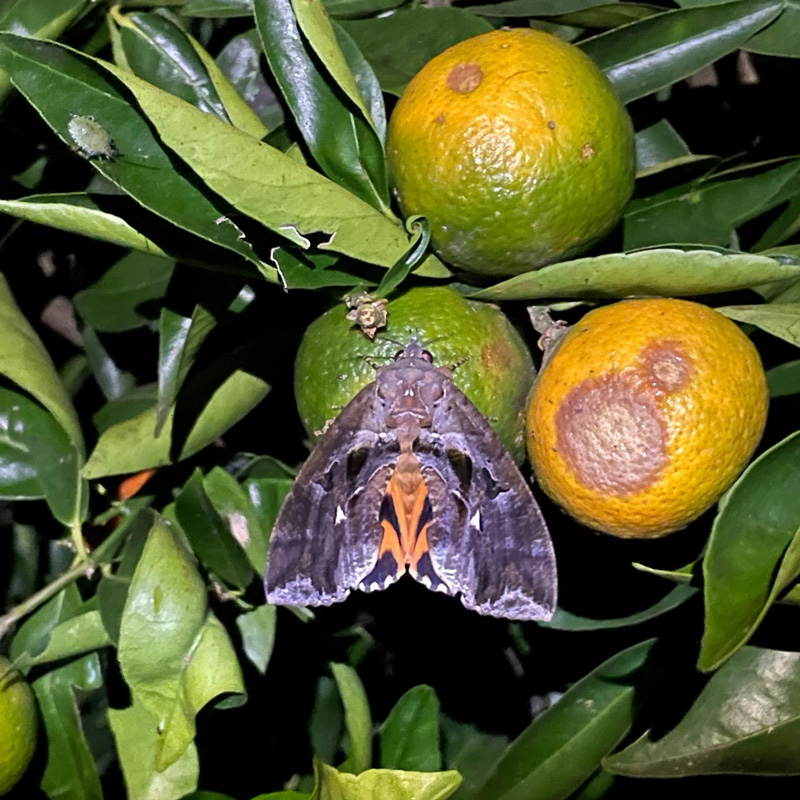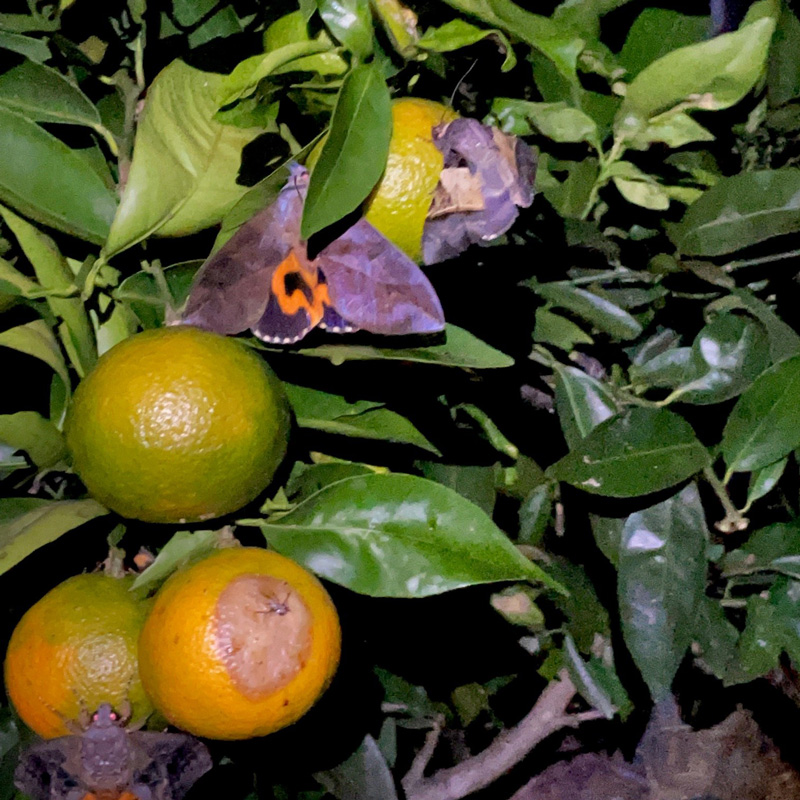Combatting the Fruit Piercing Moth: Strategies for Gardeners
Fruit-piercing moths are a persistent threat to any gardener with beloved fruit trees or ripening produce. These nocturnal insects possess a unique, barbed proboscis capable of puncturing the skin of even tough fruits. They feed on the sweet juices, leaving behind unsightly wounds that invite rot, disease, and other pests. The damage can range from cosmetic blemishes to complete fruit loss, making it a real headache for fruit growers.
This blog post aims to arm you with the knowledge you need to combat the fruit-piercing moth. We'll cover tell-tale signs of their presence, preventative measures to deter these pests, and effective control techniques if an infestation does strike your garden. By understanding the fruit-piercing moth, you'll be equipped to protect your harvest and enjoy the fruits of your labor.
Understanding the Fruit Piercing Moth
 Description and Life Cycle: Fruit-piercing moths are large and striking. They have olive-brown to reddish forewings and vibrant hindwings with orange and black markings. These moths go through a complete metamorphosis. Females lay eggs on specific host plants, and the emerging larvae (caterpillars) feed on foliage. After pupation, the adult moth emerges with its specialized piercing mouthpart.
Description and Life Cycle: Fruit-piercing moths are large and striking. They have olive-brown to reddish forewings and vibrant hindwings with orange and black markings. These moths go through a complete metamorphosis. Females lay eggs on specific host plants, and the emerging larvae (caterpillars) feed on foliage. After pupation, the adult moth emerges with its specialized piercing mouthpart.
Why It's a Problem: The issue lies with the adult moth. Their strong proboscis lets them pierce the skin of ripening fruits like citrus, mangoes, bananas, and more. This creates entry points for bacteria and fungi, leading to rapid rot and spoilage. The damage compromises fruit quality, lowers yields, and can even attract other pests to your garden. Not only does the moth directly damage the fruit, but it also ruins entire crops due to secondary infections.
Prevention Strategies
Garden Hygiene: A clean garden is a less inviting environment for pests. Regularly remove fallen fruit, rotting produce, or any debris from around your fruit trees. This disrupts their breeding grounds and reduces potential food sources for the moths.
Barriers and Nets: Invest in fruit fly netting to drape over vulnerable trees or individual fruits. Nets offer a physical barrier, preventing the moths from ever accessing the fruit. Ensure the netting doesn't directly touch the fruit. Otherwise, the moths can simply land on the other side and continue sucking!
Companion Planting: Nature offers its own defenses! Plants like marigolds, basil, or garlic emit scents that deter fruit-piercing moths. Incorporate these into your garden layout for a natural repellent. Additionally, plants attracting beneficial insects (like ladybugs and lacewings, which are natural predators of the moth) provide organic pest control.
Targeting Caterpillars: The caterpillar stage of the fruit-piercing moth feeds on the foliage of specific host plants. Using organic sprays like Bacillus thuringiensis (Bt) on these host plants can prevent the caterpillars from developing into fruit-damaging adults.
Several growers have noted success using Sero-X Natural Insecticide. Derived from native Australian violets, Sero-X has unique properties:
- Anti-feedant/Repellence: May deter pests from feeding on treated plants.
- Ovi-position Deterrent: May discourage moths from laying eggs on treated areas.
Lighting Considerations: Yellow or amber lights have shown some success in disrupting the moths' nocturnal activity and preventing them from feeding. However, more research is needed to determine the most effective type and placement of lights for deterring fruit-piercing moths.
Control Methods
 Natural Predators: Your garden has its own defence system in the form of beneficial predators. Encourage ladybugs, lacewings, parasitic wasps, and certain birds (bats and owls are particularly helpful) into your garden. Plant a variety of flowering plants to attract them and provide shelter. Reducing pesticide use will also help preserve these natural allies.
Natural Predators: Your garden has its own defence system in the form of beneficial predators. Encourage ladybugs, lacewings, parasitic wasps, and certain birds (bats and owls are particularly helpful) into your garden. Plant a variety of flowering plants to attract them and provide shelter. Reducing pesticide use will also help preserve these natural allies.
Organic Pesticides: If prevention fails, there are organic control options. Neem oil, a natural deterrent and insecticide can be effective when applied to foliage. Additionally, Bacillus thuringiensis (Bt), a naturally occurring bacteria, targets the caterpillar stage of the moth. Always prioritize products safe for pollinators and edible crops.
Sero-X Natural Insecticide: Several growers have noted success using Sero-X Natural Insecticide. Derived from native Australian violets, Sero-X has unique properties:
- Anti-feedant/Repellence: May deter pests from feeding on treated plants.
- Ovi-position Deterrent: May discourage moths from laying eggs on treated areas.
Cultural Practices: Simple changes can make your garden less hospitable to moths. Harvest fruit as soon as it's ripe to reduce temptation. Strong-smelling herbs or spices placed around fruit trees may act as repellents. Additionally, nighttime inspections with a flashlight (the moth's eyeshine makes them easy to spot) allow for handpicking and removal.
Important Note: Always research and follow the instructions on any pesticide, even organic options.
DIY Solutions and Home Remedies
Several DIY solutions can help deter fruit-piercing moths. A mixture of molasses, vinegar, and overripe fruit can be placed in a hanging trap to lure and trap moths. Additionally, try spraying a dilute solution of chilli pepper or garlic on foliage – the strong odour can act as a repellent.
Important: Use DIY solutions with caution. Some remedies may inadvertently attract other pests or have unintended consequences. Before widespread use, test a small area of your plants to ensure there are no adverse reactions.
Closing Out
Protecting your fruit harvest from fruit-piercing moths isn't a one-time battle, but a continuous effort. By combining proactive prevention, careful monitoring, and appropriate control methods, you can significantly reduce damage. Don't hesitate to experiment and find what works best in your garden. For further guidance and resources on pest control, visit The Garden Superstore. Share your own tips and experiences in the comments below!
Act now – your delicious, unblemished harvest awaits!

